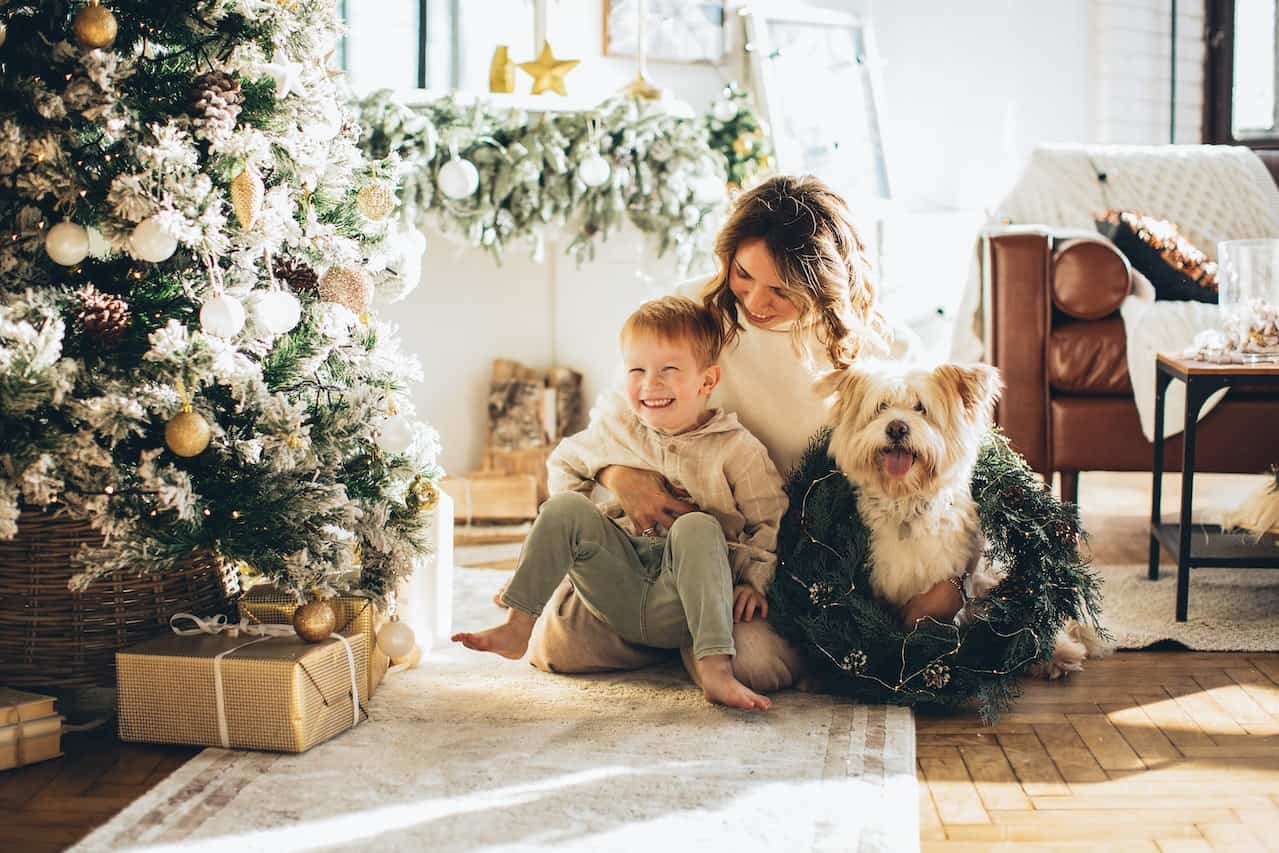When it’s finally time to decorate for Christmas, you probably have your mind on a few things: where to put the tree, whether to buy new ornaments, and just how many DIY crafts you can squeeze in before the holidays. But many folks forget to consider their furry family members, which can put them at risk, especially when it comes to bringing plants into the home.
Potted plants and pines can be lovely additions to Christmas décor, particularly because the outdoors can be frozen and bare. But which decorative Christmas plants are safe for pets?
While the poinsettia has come under fire for its toxicity to canines and felines alike, you may be surprised to learn it’s actually not the big bad plant we’ve been told to fear. In an interview with Be Chewy, integrative veterinarian Carol Osborne, DVM, said, “Around Christmas time, we see all these warnings on the internet about poinsettias.
Well, poinsettias never killed anybody.” To help you navigate decorating for Christmas in a way that’s safe for all your family members, here are the most toxic plants you should absolutely avoid this holiday season and which are safe (and beautiful) alternatives.
Leave this off your shopping list
Few things are as iconic as stealing a kiss under a bough of mistletoe in the doorway, but these berries are actually quite dangerous to both people and pets, says Tammy Noble, a registered nurse with Iowa Poison Control Center, in an interview with Radio Iowa.
And that isn’t just limited to their white berries, which can cause death in pets and severe gastrointestinal symptoms in people, as mistletoe leaves and flowers are also dangerous if ingested. Instead, look for a faux mistletoe plant to hang in your archway, like this one from NESTRE on Amazon.
According to the Veterinary Emergency Group, you should also avoid holly, the other popular holiday berry, which is toxic to people, dogs, cats, and other pets.
Symptoms of holly poisoning in pets are lethargy, bleeding in the mouth, vomiting, diarrhea, and drooling, and can become severe, especially in older and immunocompromised pets. So go ahead and choose faux berries this holiday season.
Try these plants instead
While poinsettias aren’t as scary as we may have been led to believe, they’re also not great for pets should they ingest them. To keep your pets happy and healthy this holiday season, we have some beautiful suggestions for plants that will add color and life to your Christmas décor.
Consider the humble house fern, or Boston Fern, which is non-toxic to cats and dogs, per the ASPCA. Indeed, its quirky branches and leaves offer great texture and color.
Looking for more color? The Spruce recommends trying a Guzmania plant, a flower-shaped, non-toxic shrub with festive hues and pineapple-top-like leaves. If you’d rather dress up the house plants you already own and which are pet-approved, add some string lights, ornaments, and garland to get them dressed up for the holidays.
And even with non-toxic plants, try to keep pets from chewing up your house plants, because ingesting leaves and flowers can still cause mild tummy discomfort and GI symptoms.
Dr. Carol Osborne is an author and world-renowned integrative veterinarian of twenty-plus years. After graduating from the Ohio State College of Veterinary Medicine, Dr. Carol completed a prestigious internship at the Columbus Zoo. Shortly afterward, she launched a very successful private practice and became the founder and director of the non-profit organization, the American Pet Institute.
Dr. Carol offers traditional veterinary care for dogs and cats with a softer, natural touch. Her approach highlights the importance of nutrition and utilizing holistic avenues in combination with traditional treatments. Currently, she offers holistic therapies and traditional veterinary medical care for dogs and cats at the Chagrin Falls Pet Clinic in Chagrin Falls, Ohio. Call our Office Today at (855) 372-2765 or complete this Form to Email our Office.
Dr. Carol Osborne is an author and world-renowned integrative veterinarian of twenty-plus years. After graduating from the Ohio State College of Veterinary Medicine, Dr. Carol completed a prestigious internship at the Columbus Zoo. Shortly afterward, she launched a very successful private practice and became the founder and director of the non-profit organization, the American Pet Institute. Dr. Carol offers traditional veterinary care for dogs and cats with a softer, natural touch. Her approach highlights the importance of nutrition and utilizing holistic avenues in combination with traditional treatments. Currently, she offers holistic therapies and traditional veterinary medical care for dogs and cats at the Chagrin Falls Pet Clinic in Chagrin Falls, Ohio.









